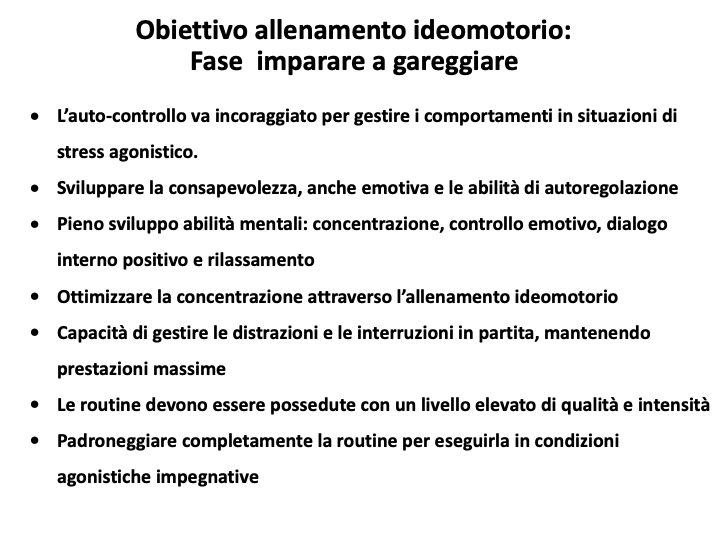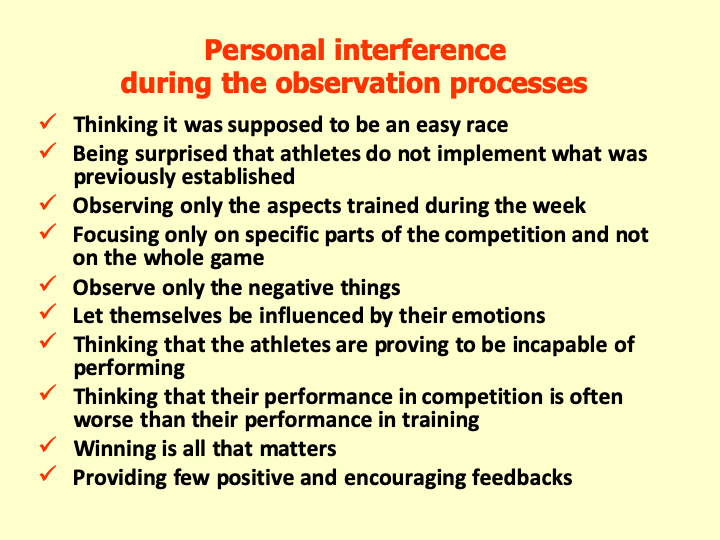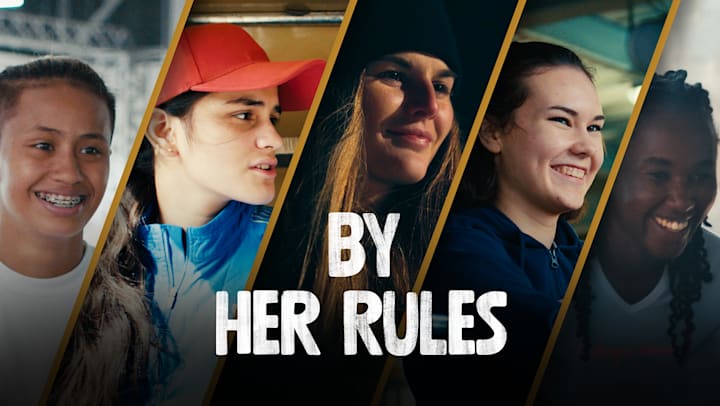Monthly Archive for May, 2021
Page 2 of 3
Five female athletes who are defying the perception of what a woman is supposed to be doing in her society, her sport or her community and changing the course of their lives as well as the world around them as they live By Her Rules.
As children, we learn to use cutlery, and so we will continue to do for the rest of our lives, never having to think about it again and never making a mistake.
The same goes for breathing, which is an automatic activity.
In attention training, however, we learn to focus on breathing, which is actually a useless activity because breathing is, as mentioned, an automatic process.
Precisely because it is an automatic activity it is however difficult to focus on breathing, we are not endowed with this ability, it is useless since we cannot not breathe.
But learning to do it, we learn to be aware and to guide an automatic process and, therefore, according to Paul Ekman we create new neural pathways, thanks to which we keep under control what happens at an unconscious level. and understand the automatic nature of emotions.
Consequently, the more time we devote to that breathing training, the greater our ability to control our emotions.
New study with 756 first through fifth graders demonstrates that a six-week mashup of hoops and math has a positive effect on their desire to learn more, provides them with an experience of increased self-determination and grows math confidence among youth. The Basketball Mathematics study was conducted at five Danish primary and elementary schools by researchers from the University of Copenhagen’s Department of Nutrition, Exercise and Sports.
In recent decades, there has been a considerable amount of attention paid to explore different approaches to stimulate children’s learning. Especially, there has been a focus on how physical activity, separated from the learning activities, can improve children’s cognitive performance and learning. Conversely, there has been less of a focus aimed at the potential of integrating physical activity into the learning activities. The main purpose of this study therefore was to develop a learning activity that integrates basketball and mathematics and examine how it might affect children’s motivation in mathematics.
Increased motivation, self-determination and mastery
Seven-hundred fifty-six children from 40 different classes at Copenhagen area schools participated in the project, where about half of the them—once a week for six weeks—had Basketball Mathematics during gym class, while the other half played basketball without mathematics.
“During classes with Basketball Mathematics, the children had to collect numbers and perform calculations associated with various basketball exercises. An example could be counting how many times they could sink a basket from three meters away vs. at a one-meter distance, and subsequently adding up the numbers. Both the math and basketball elements could be adjusted to suit the children’s levels, as well as adjusting for whether it was addition, multiplication or some other function that needed to be practiced,” explains Linn Damsgaard, who is writing her Ph.D. thesis on the connection between learning and physical activity at the University of Copenhagen’s Department of Nutrition, Exercise and Sports.
The results demonstrate that children’s motivation for math integrated with basketball is 16% higher com-pared to classroom math learning. Children also experienced a 14% increase in self-determination compared with classroom teaching, while Basketball Mathematics increases mastery by 6% compared versus classroom-based mathematics instruction. Furthermore, the study shows that Basketball Mathematics can maintain children’s motivation for mathematics over a six-week period, while the motivation of the control group decreases significantly.
“It is widely acknowledged that youth motivation for schoolwork decreases as the school year progresses. Therefore, it is quite interesting that we don’t see any decrease in motivation when kids take part in Basketball Mathematics. While we can’t explain our results with certainty, it could be that Basketball Mathematics endows children with a sense of ownership of their calculations and helps them clarify and concretize abstract concepts, which in turn increases their motivation to learn mathematics through Basketball Mathematics,” says Ph.D. student Linn Damsgaard
Active math on the school schedule
Associate Professor Jacob Wienecke of UCPH’s Department of Nutrition, Exercise and Sports, who supervised the study, says that other studies have proved the benefits of movement and physical activity on children’s academic learning. He expects for the results of Basketball Mathematics on children’s learning and academic performance to be published soon:
“We are currently investigating whether the Basketball Mathematics model can strengthen youth performance in mathematics. Once we have the final results, we hope that they will inspire school teachers and principals to prioritize more physical activity and movement in these subjects,” says Jacob Wienecke, who concludes:
“Eventually, we hope to succeed in having these tools built into the school system and the teacher’s education. The aim is that schools in the future will include “Active English” and “Active Mathematics” in the weekly schedule as subjects where physical education and subject-learning instructors collaborate to integrate this type of instruction with the normally more sedentary classwork.”
(Source: phys.org)
Chiara Cainero, Italian shooting champion and Olympic gold medalist, wrote this today about her latest competition. It’s something we should all learn.
“When nothing seems to help, I like to watch a rock breaker and how he hammers his rock, maybe even a hundred times without ever feeling the smallest crack. Then, on the one hundredth blow, the rock splits in two. And I know it wasn’t the last blow that broke it, but all the ones that came before.”
Quote that appeared in the San Antonio Spurs locker room!
After 19 months of stop from competitions due to COVID , I come home from the World Cup in Lonato with a Gold medal in Team, a Silver in the Mix Team and a fifth place individual.
The #goal is to keep #working and give my best to reach more and more important goals!
Nello sport si parla molto di come sviluppare le competenze psicologiche degli atleti. In questi ultimi 30 anni sono stati formulati programmi che prevedono l’apprendimento delle abilità mentali di base a partire dalla fine dell’infanzia, per poi giungere negli anni dell’adolescenza a piani di allenamento specifici per ogni disciplina sportiva e, infine, a programmi altamente personalizzati per gli atleti di livello assoluto. Un programma così diversificato non è stato invece proposto per chi ricopre la responsabilità di guidare i giovani attraverso queste fasi della loro vita sportiva: gli allenatori.
Le ricerche evidenziano che gli atleti vincenti richiedono allenatori che siano eccellenti, non solo per i programmi di allenamento che propongono ma come leader che li guidano con competenze tecnica e psicologica. Lo stesso sostengono allenatori come José Mourinho quando afferma che chi conosce solo di sport non sarà mai un allenatore di successo, o Jurgen Klopp quando dice che: “Bisogna servirsi della tattica con il cuore. La partita va vissuta intensamente altrimenti è noia”. O Pierluigi Pescosolido, Fiamme oro e allenatore di molti campioni del tiro a volo, con cui da molti anni ci confrontiamo per migliorare continuamente l’allenamento di questi atleti di livello assoluto parlando della gestione della loro vita, della concentrazione nei momenti decisivi, delle competizioni ma anche di come insegnare queste competenze ai giovani junior che si affacciano per la prima volta al mondo competitivo.
Emerge così con forza la rilevanza della dimensione psicologica del lavoro dell’allenatore a livello giovanile e assoluto. Sono queste le ragioni che mi hanno convinto ad accettare l’invito di Psicosport, l’organizzazione che da 28 anni realizza il più longevo e di successo Master in Psicologia dello Sport, a promuovere insieme a un gruppo di esperti un Master TOP per allenatori in Tecniche di Ottimizzazione della Performance Sportiva. L’obiettivo è duplice:
- Migliorarne le competenze psicologiche in qualità di specialisti della Prestazione.
- Ottimizzare le loro abilità nel supportare gli atleti a costruire un profilo vincente in ogni impegno della vita sportiva.
- Auto-sviluppo - Sviluppare le risorse dell’allenatore e la sua comprensione psicologica degli sport.
- Eccellenza - Identificare le aree di miglioramento dell’allenatore e sviluppare un piano di azione personale.
- Leadership - Conoscere e applicare gli stili di leadership più efficaci.
Peter Olusoga, Ian Maynard, Kate Hays & Joanne Butt (2011). Coaching under pressure: A study of Olympic coaches, Journal of Sports Sciences.
The Tokyo Olympics are approaching and I want to mention the importance of the psychological component of performance, thanks to research in Great Britain conducted a few years ago with the participation of national team coaches to identify the factors that influence winning performances at the Olympics. It was recognized the relevance of a large number of psychological dimensions learned by athletes and teams during their careers.
Regarding the training of coaches, the importance of the development of their psychological and interpersonal skills emerges clearly in order to aspire to work with top-level athletes and young talents.
Factors influencing successful performance on the Olympic stage.
- Emotional control
- Perception and focus
- Confidence
- Communication
- Passion and fun
- Commitment and Consistency
- Strategic approach
- Lifestyle choices and Previous experience
- Contingency planning
- Coping at the event
- Coach-specific strategies
- Team support
Jonas Lindahl, Andreas Stenling, Magnus Lindwall, & Cristian Colliander (2014). Trends and Knowledge Base in Sport and Exercise Psychology Research: A Bibliometric Review Study. International Review of Sport and Exercise Psychology.
Bibliometric methods were used to examine: (I) research themes in sport and exercise psychology articles published between 2008 and 2011; and (II) the intellectual base of the field of sport and exercise psychology, defined as influential literature being cited in these articles. The dataset consisted of 795 articles from five sport and exercise psychology journals and 345 articles obtained through citation-based extension (N = 1140 articles).
Some main findings were: (a) the identification of many re-emerging themes, (b) research related to motivation seems to be extensive, (c) sport psychology and exercise psychology research share theoretical frameworks to some extent, however (d) differences compared to previous reviews indicate that sport psychology and exercise psychology may be regarded as 2 distinct research fields, rather than 1 united field, (e) isolated research areas were identified indicating potential for research integration.
As can be seen, the topics of motivation, performance, anxiety, and emotions continue to be the most investigated and cited topics.
| Principal component labels | Number
of authors |
Number
of citations |
| 1. Motivation: Self-determination theory | 26 | 3000 |
| 2. Performance, anxiety, and choking | 17 | 1474 |
| 3. Motivation: Achievement goal theory | 16 | 1861 |
| 4. Stress, coping, and emotions | 15 | 1262 |
| 5. Behavior change, physical activity and health | 12 | 1350 |
| 7. Structural equation modeling | 11 | 1162 |
| 6. Qualitative methods | 11 | 789 |
| 11. Talent development and expertise | 9 | 961 |
| 10. Perfectionism and burnout | 8 | 646 |
| 9. Youth development through sports | 8 | 733 |
| 8. Leadership and coach-athlete relationships | 7 | 713 |
| 12. Imagery, self-talk, and self-efficacy | 7 | 482 |
| 13. Perceived exertion, affect, and physical activity | 3 | 232 |
| 14. Morality | 3 | 148 |
An important issue in any profession, so including sport training, is to understand the psychological and social component of your job. You can be a good surgeon or engineer but also be a bad manager. The same goes for a coach, you can know very well the technical dimension of your job but be a bad coach. In other words, someone who only knows the technical side of his job cannot lead other people. Just as champions are not built in the gym, as Muhammed Ali said, managers are not built in the classroom.
They must be taught to live in their own context, to improve themselves by giving them the opportunity to learn from their experiences.
We need to develop leadership coaching activities in sports starting from the coaches’ experiences. Teach them to listen to themselves and we have to listen to what they have to say in order to understand how they think, how they manage their emotions and how they bring their ideas to others.
Certainly we need to know our work but if we do not know how to communicate it effectively it will be completely useless, our athletes may follow us but because they have no alternative and not because they are confident that the proposed system is the best for them.
And let’s remember that those who don’t want to improve are left behind.








